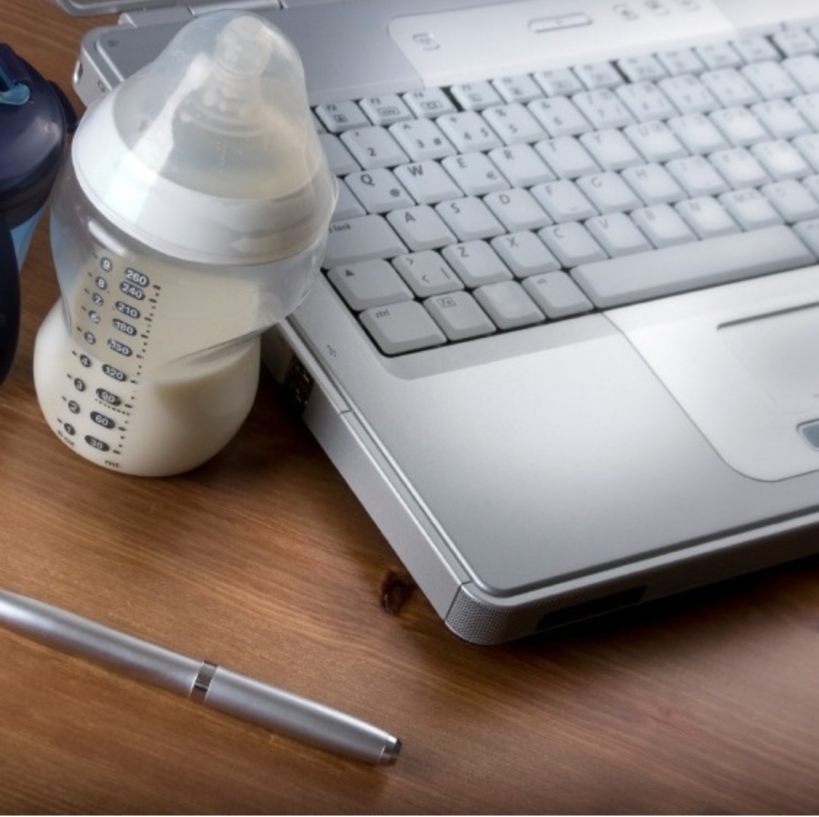The signs were there.
After three weeks of waking 5 or more times per night to comfort my 9-month old child, who was hell bent on standing up in her crib and screaming at the top of her lungs until “the milk,” as my husband so affectionately calls me, arrived to soothe her aching teeth or ease her separation anxiety (or whatever the heck happens at 9 months), I was beginning to crack.
Take for example a few days before when I inadvertently consumed eggs that were well past their prime. Bleary eyed from complete and utter lack of sleep, I squinted absentmindedly at the expiry date on the side of the carton. It was only after I was doubled over in pain, lying in the fetal position on the floor as my angelic daughter repeatedly pummelled me with plastic bowling pins that I realized it was actually June, not May, and the eggs were more than a month rotten. It was not my finest moment.
But my lowest low came the following day, when overwhelmed by a sense of failure due to another sleepless night, I suddenly found it hard to stand from the seated position I had assumed.
Shoulders hunched, head held low as I watched my beautiful baby play on the floor, the flood gates opened and tears streamed down my face. I wasn’t worthy of her. I couldn’t help her sleep. I couldn’t ease her painful teething and I couldn’t seem to quell her insatiable nighttime hunger. Each evening thereafter I felt like more and more of a failure, regardless of how many sleep techniques I employed or how much of the cherry-flavoured, glorified placebo I gave her to soothe her constant ache.
Label it in any way you like but the truth of the matter is, I felt used up. Like a well gone dry, not from some cataclysmic event but from a thousand infinitesimal drops stealing out of me over time.
There was only one other occasion when a similar “spell” happened to me; it occurred during my daughter’s 6-month milestone. But after weeks of unexplained night wakings, something magical happened – my baby began sleeping again. Not through the night mind you, but for longer periods. Every two hours increased to every four and gradually, to every six. With each hour of undisturbed slumber I came to remember who I was and gained increased confidence in by ability to “Mother” as both a verb and a noun.
This pattern is now repeating itself and I am happy to say that my little girl is progressing out of her milestone (and can now stand unassisted and take a few steps to boot). Before this hurdle becomes a distant memory packed away in the vault of things I’ll likely repress in order to have a second child, I wanted to share some advice to others experiencing a strong sense of draining – whether it be from a lack of sleep, an utterly unpredictable schedule, or conversely, the daily monotony that can come with raising a young child.
Please, replenish your well. I don’t care what it takes, just set aside some time for yourself today.
Get ritualistic with your daily Cup o’ Joe.
It can be as simple as brewing a nice cup of coffee or tea at the start of the morning and having 15 minutes alone to enjoy it as you read the paper or get caught up on social media. Regardless of what the day may bring, that’s your undisputed “ME” time. So let your significant other take up arms for you, because lord knows, your own arms will be full for the rest of the day.
Go outside.
Even if you have to take your children with you, the simple act of leaving the house can be transformative on the psyche. After being cooped up for hours with a wailing child even a cloudy day can be a welcome distraction from your four walls. If you absolutely can’t leave, try to fill your space with visual cues, reminders of the things that bring you joy and fill your bucket. From photos of happy moments with your wee ones to cherished books or pieces of art, all carefully positioned out of arms reach, of course.
Confide in others.
As women, we’re raised to believe that it’s a sign of weakness to share the much-protected truth that motherhood, in all its facets, can be wholly overwhelming. Laying down your guard and sharing with others allows you to see your own situation from another’s perspective. It needn’t be in person; there are a slew of mommyblogs out there telling it like it really is. I think it should be a prerequisite for every soon-to-be mom to swap her glossy Parenting mag for at least one raw mommyblog before having children. There is a whole village of support out there just waiting to buoy you up momma, so dive right in.
Give yourself a hall pass.
As someone who chronically says “sorry” (even more so than your typical Canadian), this idea is particularly revolutionary for me. From this day onward I am allowing myself to act unapologetically at least once every 24 hours. This may sound minor but it’s more difficult than you think for a first-time mom. I’m talking absolutely no guilt and no second guessing yourself. If the house is a mess, just leave it. Are the groceries still on the supermarket shelf, miles away from your pantry? Then order pizza. Better yet, just get the hell up and outta dodge while your significant other makes dinner, feeds and washes the kids and puts them to sleep. The fact is, as parents we need to lean on one another and also be the shoulder that bears the weight of the world for another. So regardless of your gender take turns stepping up, and also breaking down. You’ll be all the more stronger for it.
Sleep.
Call your family members, your friends, a trusted neighbour and get them over to your house ASAP while you recharge your batteries. Hire a babysitter for two hours if you need to, or forgo your Netflix, AMC or HBO addiction to get caught up on your Zzz’s (or better yet, PVR that sh*t). Nothing outside of fulfilling the needs of your child, and maybe eating, is more important to a new mother than sleeping. Without it, even the smallest tasks or requirements can become monumentally draining.
Get help.
Post partum depression (PPD) and anxiety are not reserved for the days immediately following birth and can occur months after your transition into new motherhood (and fatherhood). PPD and anxiety are more than just a few “bad days” here and there. But don’t be unnerved by the labels, they are common conditions that absolutely must not be stigmatized. It is important to recognize the symptoms and feel empowered to seek out appropriate supports when necessary.
Lastly, see yourself as the well you are.
Like water, your love and support helps your children thrive and grow. So remember, the more you can do to replenish yourself, bit by bit, the more you can ensure the wellbeing of those who depend upon you most.




